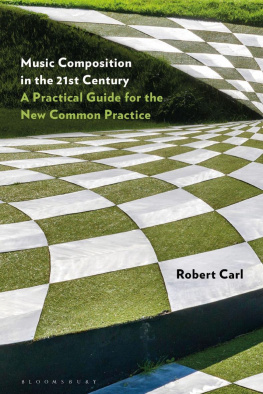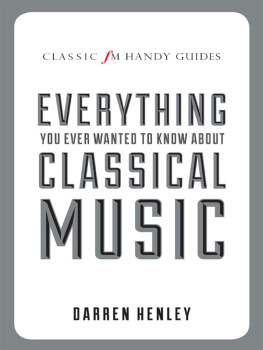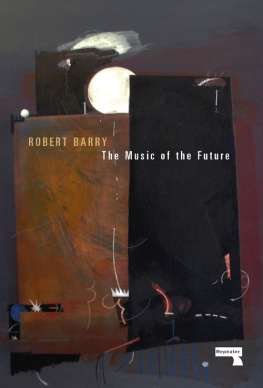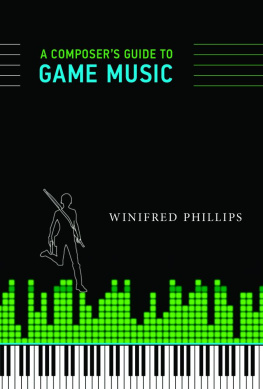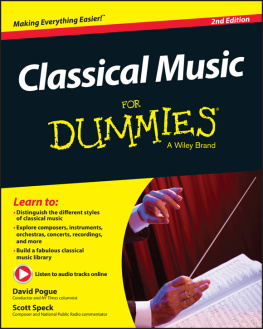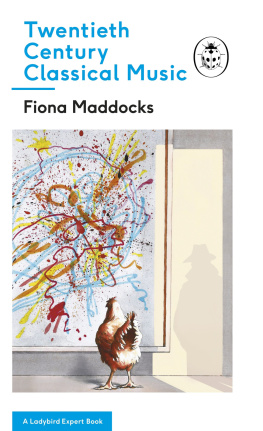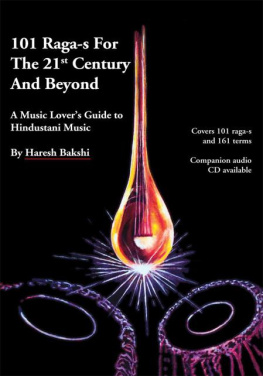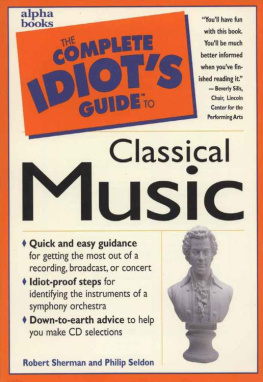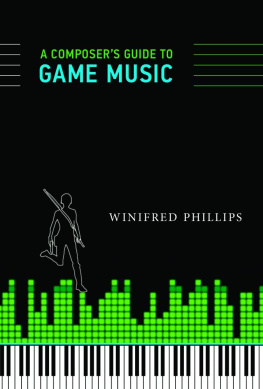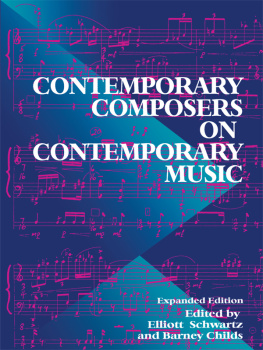To those peer-composers who have been friends now for decades, with whom I have always felt I could share work and ideas in a spirit of support, open criticism, and healthy rivalry. You know who you are.
Thoughts to the reader on how to use this book, and ...
A few needling questions (that I suspect you are thinking)
If you now have opened this book, it already has marked you as a very particular type of person. You are most likely a musician. Perhaps you are a performer specializing in newer music, or are curious about the music that many of your friends and peers are playing. Perhaps you are an artist in another field, you encounter music all the time, but you want to explore things that satisfy your aesthetic curiosity in a way mass-produced pop cant. You may have even heard classical pieces by living composers that speak to you in a way you didnt imagine, for example, Reich, Prt, and Anderson. You might even be a cultural omnivore who wants to understand fields outside your comfort zone (and if so, bless you, and arrange to be cloned).
But most likely you are a composer, and you are also probably a younger one. You may have this text as an assigned supplement to a course in composition, contemporary repertoire, or twenty-first-century techniques. You may have been given it by a teacher, mentor, or family member who thinks it might speak to you (or perhaps you are instead that relative to whom your own younger composer has given it, hoping to explain this mysterious practice). You may be just starting out, or you may be well on your way. In any of these cases, I think it will have something new to show you, a perspective you may not have anticipated, and a challenge to your thinking about this vast, disorderly, constantly changing, and often perplexing field. If it has any ultimate benefit, I hope it will start to create connections between personalities, practices, and ideas that may have seemed to you an irreconcilable jumble.
I wish I could be writing for a more general audience, one thats curious and keeps abreast of the major players and issues in the field. Such an audience seems to exist for the visual arts, certainly for film, less so for literature and drama, even less for poetry (though still real). Music that is not a commercial product, however, is low on the totem pole. People who otherwise are highly educated and consider themselves cultured have very little time or interest for music that doesnt make it through the strainer of media promotion. If you keep reading, youll see that this is not a rant against popular music; in fact I see within it an emerging reaffirmation of the musical values I advocate. But a knee-jerk reaction to any music with the slightest degree of abstraction, that labels it as cerebral/heartless/ugly, seems to be all too common. Ultimately, lets be honestIm writing both a defense of and a prediction about what has been called classical music, the music I live within the most. On the one hand, what could be more pass? But on the other, I also believe that a framework for the conception and propagation of this music we dare not name is becoming more broad and inclusive every day. Youll get a taste of this thinking in the following chapters.
And so while Ive written this so that a lay listener might understand just about everything here, it will likely be most useful for younger musicians (though peers and elders are always welcome). Anything I say will be up to them to take apart, accept, or reject. Maybe Ill end up laughable in their eyes (and ears), but Im willing to take that risk. I dont want to be the creepy old guy whos hanging out with the young at the party while they tactfully cast about for a way to avoid him. But I care for them all the same. Frankly theyyou!are so courageous, the times are so utterly inhospitable to you (well get into that too), that you deserve to be honored with some frank talk and free advice. And because I love what we all do so much, I can only hope that some of my insights might advance the cause, beyond whatever I may be able to accomplish in my own art or career.
And , just so I dont start to seem too solicitous of the approval of the young, I also want to figure this out for myself. The pleasure of discovery and connection in this sort of inquiry feels very similar to composition itself. So its also a quite selfish endeavor.
And now the Reader responds:
So Who Are You to Talk?
An excellent question and a challenge. I cant claim to be the most successful composer around, Im known in the field, but certainly less than many bigger names, even of my generation. So why do I think I might have something worthwhile to tell you? Id like to think it comes from my belief in the value of my experiences and the nature of my mind.
For the first, as I reach the midpoint of my seventh decade (a fact that my body and spirit cant comprehend, as it seems Ive just started my life in earnest), I find I have an unusually wide range of musical personae. Primarily I am a composer, and that informs everything I will write in this book. I know what its like to put notes together in a convincing manner, and by now I am deeply involved in the creation of a practice I find comprehensive, imaginative, expressive. For me, it has globality. But this is something I will explore more fully later; near the end of these chapters Ill tip my hand as to who I am as a creative being in terms of my practice (from basic technique to overarching aesthetic), and how it has influenced these chapters should become apparent. Till then, who I am creatively can come out slowly, elliptically, tangentially. You can always google me and listen to things online. And you can skip to the end if the suspense is too great. I feel a creative self-portrait will emerge, but only as a sort of shadow that gains more substance over time, through its interactions with the ideas that will fill these pages.
Second, Im a critic, writer, and thinker about music. Ive always been such: Ive loved the free play of the mind, set loose within the domain of music, blown by its winds, moved by its tides, but also discovering a course that leads to new lands. Ive traveled a lot across other cultures that excite me (Western and non-Western); Ive listened to and processed an enormous amount of music; Ive written a stream of criticism, articles, and books. There are only a few other composers whom I feel have taken my route and reached my level (whom I will honor and acknowledge ahead). At this point, so many concepts have come together for me that I feel they have reached a critical mass, and can actually present a coordinated intellectual structure, a framework for assessing the current state of the art. I feel the way I do when a piece is ripe. It has to come out, or I may burst.
Third, Im a teacher. And this leads to the focus of this work. For over a quarter century now, Ive been sitting in a room, one-on-one, with a young person bringing me her/his piece for commentary, criticism, counsel. And all the time Ive been dispensing advice, Ive been li stening. And from what Ive heard, I have developed a strong feel for what young composers are thinking, how they make judgments, what interests them, what matters to them. Im peering into the world beyond my death when I converse with them, imagining a world I will never see. I have things to teach, but they do too. And from them, I have a glimmer of whats ahead.
So What Kind of Book Is This?

